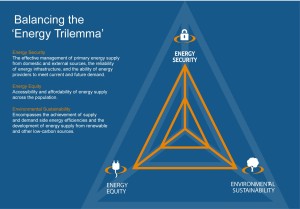The 2015 Energy Trilemma Index report, developed in partnership with the global management consultancy firm Oliver Wyman, will be presented by many other member committees over the coming months.
UK: In presenting the importance of applying the “Energy Trilemma” approach to groups of leading industry experts in London, Joan MacNaughton, Executive Chair of the World Energy Trilemma study, said: “It has become clear over the five years that the Energy Trilemma Index has been published that progress is slow. The pace needs to pick up – even if it is a ‘long road from Paris’. It will only be sped up by more collective engagement of policymakers, energy business leaders and the finance sector to translate the words of Intended National Determined Contributions into effective actions at national level.”
In the 2015 Index, the UK rating was downgraded to an ‘AAB’ rating reflecting the impact of the rising cost of electricity in relation to the cost of living. The UK remains on the negative watch list because of the risks to energy security posed by the complex reform of its electricity market and the need to replace ageing legacy infrastructure. Its downgrading is symptomatic of the challenges faced by countries across the world to apply a balanced approach to energy policy while securing the finance to transform their energy systems.
Switzerland and Sweden: These were the only two countries to be awarded an ‘AAA’ rating with Switzerland taking the ‘gold’ award and Sweden the ‘silver’ award.
Christoph Frei, Secretary General, who launched the Trilemma Index in both Switzerland and Sweden said: “Switzerland’s leading position in the Index reflects the country’s past energy and energy-related policies. Energy equity in Switzerland is high and it continues to be the best in the world at limiting its impact on the environment, with low levels of pollution and an ultra-low emission energy infrastructure, which utilises fossil-fuelled power plants for only 1% of electricity generation."
“Sweden is a ‘Pack leader’. It exhibits a strong, well-balanced performance on all three energy dimensions. The country’s mitigation of its impact on the environment continues to rank among the best in the world, with comparatively low emissions intensity and air and water pollution levels.”
Frei went on to say: “The report’s findings show that the best-performing nations tend to be developed countries with higher shares of energy coming from low- or zero-carbon energy sources supported by well-established energy efficiency programmes. Switzerland and Sweden owe their leading Trilemma status to their stable and consistent policy frameworks, but now they are at a critical cross-roads. They will have to take key decisions about how to move forwards, and critical to their success will be the ability to secure the necessary finance to do what they want to do.”
Costa Rica: Latin America & the Caribbean Vice-Chair José Antonio Vargas Lleras presented the 2015 World Energy Trilemma Index at the 50th Reunión Altos Ejectivos in Costa Rica to 200 high level representatives from the Latin American electricity sector.
Speaking at the launch, Vargas Lleras said: “Countries in the region have a good standing on environmental sustainability and energy security – on environmental sustainability Costa Rica, Colombia and Uruguay are in the top 5 worldwide – but on energy equity much more needs to be done."
“Ecuador and Uruguay are examples of countries in the region who have made very significant improvements in the energy security dimension of the Trilemma. These improvements reflect very clear policies by Uruguay to develop renewables, and in the case of Ecuador to progress very ambitious hydroelectric projects.”






